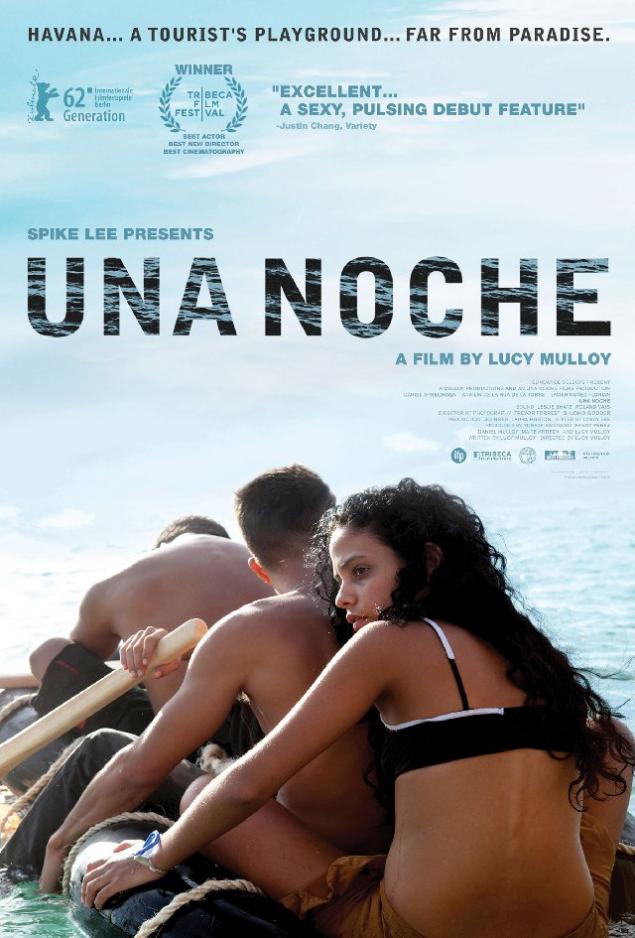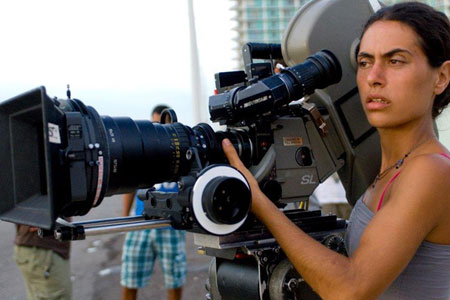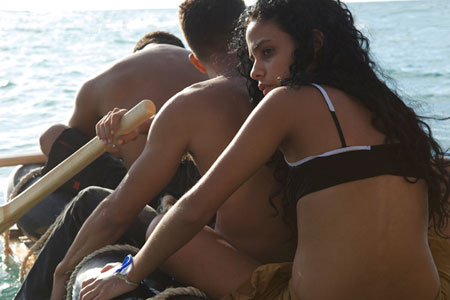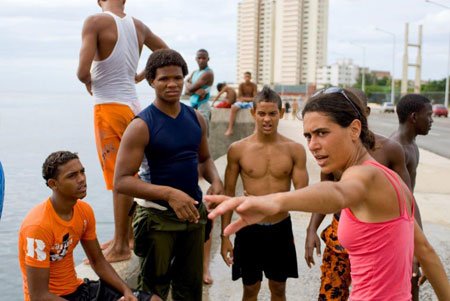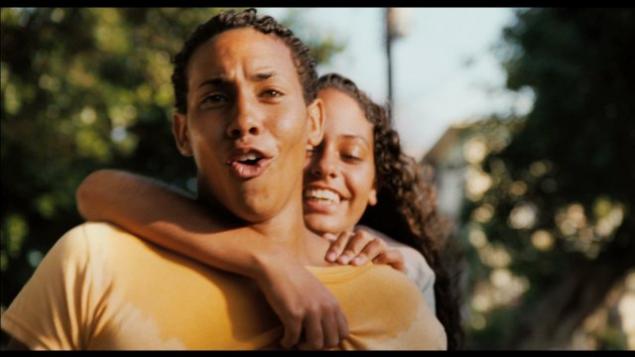__________________________
22 August 2013
Making UNA NOCHE in Cuba:
Interview with
Director Lucy Malloy
Spike Lee believed in Lucy Malloy’s Cuban drama that he offered to present the film and mentor the British-born director throughout the filmmaking process. The first-time filmmaker behind UNA NOCHE tells CineMovie it was not an easy process especially when it came to shooting in Cuba. Lucy Malloy met Spike Lee during her studies at NYU and he eventually became Malloy’s mentor. The Malcolm X and Do The Right Thing director helped Malloy with script development and through the various editing sessions, according to the NYU alumni. During CineMovie’s one-on-one interview with the British-born filmmaker, she said of the auteur. “He’s very supportive of young filmmakers.” UNA NOCHE takes place in Havana, Cuba and centers on the relationship between a brother and sister. When Elio decides to migrate to Cuba with his best friend Raul, he is torn between love for his sister and his desire to start a new life in America.
Lucy Malloy was inspired to make the film from her time in Cuba after graduating. While there she learned Spanish, Taekwondo and studied the culture. She found Havana visually compelling with its 50s feel, but she saw people “hungering for new things.” “It’s a collision of different worlds,” says the first-time filmmaker. Inspired by what she saw, she wrote a short film, which eventually became the feature length UNA NOCHE. Shooting in Cuba would be Malloy’s greatest hurdle, but she had an advantage. Having a British passport made things slightly easier since she’s excluded from the American embargo against Cuba. Embarking on her first feature film in Cuba also gave her an advantage, according to Malloy.
“We were kind of young and naïve at that, but it carried us a long way.”
Determined to make UNA NOCHE in Cuba, nothing was going to stop them but it would be a long journey. Luckily for the production, she met a Cuban official from the Asociacion de Audiovisual who opened the doors for them to shoot in Havana without having to go through the Cuban Film Institute. UNA NOCHE was produced ‘very independently,” which Malloy is proud of.
Finding the actors would be the next challenge and casting took months searching for the right individuals to play Raul, Lila and Elio. Malloy and her crew flyered at high schools, beaches, teen hangouts and acting schools. After months of open auditions, they found non-actors Dariel Arrechaga, Anailin de la Rua de la Torre and Javier Nunez Florian. In true independent filmmaking, the UNA NOCHE production next had to wait for the 35mm cameras to become available from the States. Once they obtained the cameras, the rolls of film were brought in with each trip to the mainland and back. Once filming began, they encountered various variables such as hurricanes, storms and electrical cuts, which are common in the Communist country. However, those setbacks caused them to rely on their resourcefulness and creativity, for which Malloy is proud of. UNA NOCHE opens in select Los Angeles movie theaters September 6, but will also be available on Video on Demand (VOD) August 26. Releasing films on VOD simultaneously with the theatrical run is not something everyone agrees on including the UNA NOCHE director. “As a filmmaker, I spend a lot of energy and a lot of heartache making it on 35mm, and I really love the way that looks and to see it in a cinema is incredible. You get all the amazing colors, rich images and you really enter that world. You get that full experience so you feel like you’re taken to Havana.” Malloy admits she’s one to watch movies on her laptop and occasionally on an iPhone, but in her own words, she “laments the loss of quality.” On the other hand, she’s content that more people can have access to a film like hers and the video age has become a sort of “democracy in film.” “It’s go its ups and downs,” she adds.
__________________________

04/30/2012
The Consequences of ‘Una Noche,’
A Film by Lucy Mulloy
When I was first asked to write about a film about Cuba, I couldn’t have been more excited. I had always been fascinated by its history, having grown up in Brazil with parents who lived through the sixties and the student movements. I was no stranger to pictures of Ché on the wall and the knowledge that they were the ones who had actually had a successful revolution. Well, that was then. As I learned that Una Noche (the movie about three teenagers trying to flee Cuba for the greener pastures) had won top awards at the Tribeca Film Festival, my heart skipped a beat.
Since I started working on this story I have had my share of heart-wrenching moments. The day after I sat down to interview director Lucy Mulloy and actor Dariel Arrechega about the film, I learned that two of the actors never made it to New York. Anailín De La Rúa De La Torre and Javier Núñez Florián, two of the stars of the film had fled when they arrived in Miami en route to the Tribeca Film Festival.
I was conflicted about how to approach this story, and as my confused heart kept pounding choices in my head, I found my answer: Start from the beginning.
So when I sat to interview Lucy Mulloy about the film, my first question was:
Why Cuba?
Lucy: Why Cuba… Cuba is so stunning and beautiful; I went there and I was kind of really taken by the visual, the energy, the people, the city itself as like an entity, the colors, the light… the whole thing… There is a kind of romantic side to the city, and a harsh side to the city, a sad tragic side, a happy side, it is so many extreme emotions in one place, and such a kind of unique place because it’s so different from anywhere else, I’ve never been anywhere that is like Havana you know?
It was funny, as soon as I got there, I felt like I would love to make a film. I wasn’t making movies, I had just graduated from doing politics, philosophy and economics.
So that was perfect!
Lucy: It’s kind of what intrigued me, and made me go there, and see the place as well, cause you know, the political situation, and to see what it’s like there.
How long were you there?
Lucy: Initially I wanted to go for a couple of months… I changed my ticket five times, an it ended up being a lot longer… My parents were like “What’s going on?” (Laughs)
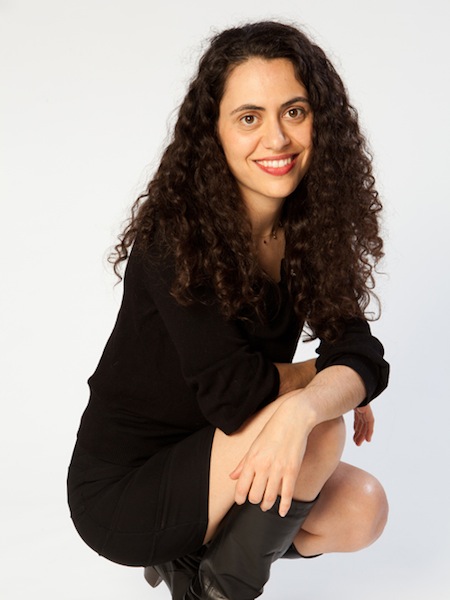
And then you came to New York to study film. Is that correct?
Lucy: Just after I got back from Cuba I applied to go to NYU and I got into the graduate school… and I actually got in with a… I wrote a feature Idea, a synopsis, just a treatment to get into NYU about a story in Cuba, and then three years later it was my thesis.
So the story…
Lucy: It wasn’t the same story, no, a completely different story… I just felt compelled, I was inspired there. I know that there are a lot of Cuban films, but I’ve never seen any, not current films… And I felt like I wanted to see that myself, so I wanted to make it… You know?
How did you do your research? Did you go to Cuba and stay there?
Lucy: I wasn’t researching. I didn’t go with the intention to research for a movie. I was living there and meeting people.
That was before you went to NYU.
Lucy: Yes exactly… and then when I decided to make my thesis, initially, it was a short film, shot on video and I just was going to make over the summer, and then Sandy, who is one of the producers, was starting to get permits, and was really excited about the project, and that kind of took longer to get the permits through and I spent more time in Havana, and it just grew, and it wasn’t one summer, it turned into… You know, cause I pretended to came back to New York and use NYU’s equipment to make a movie here, and suddenly… Well, I didn’t do that. (Laughs)
You had a Cuban crew?
Lucy: There was a Cuban crew… and then people came over from the UK, and Spain, and from Mexico… A lot of amazing people came through, and worked really, really hard. It was a really tough shoot because it was long hours… People probably came out with the idea… Hey, we get to hang out in Cuba and… no. We were working all the time. Basically from the day they arrived.
Your casting process, how was your casting process?
Lucy: It was very intense, I saw over 2,000 people for the casting… I did it as a street-casting thing, so we gave out a lot of fliers, word of mouth, people meeting other people, and getting them to come to auditions. I spent a number of weekends just doing improvisations with people, we had lines going all down the street, a lot of people came.
Were they actors?
Lucy: No, none of them were actors, but they were actors, (laughs), in some ways they all had… they were really good at kind of playing and believing and being open and free, and receptive and really investing a lot of emotions in the characters and being open to each other…
Did you have the screenplay done ahead of time?
Lucy: The actors actually worked from a tight script, like everything they said was pretty much scripted, yeah, but they learned really really well, you know we worked together for a year.
So you worked together for a year before you started shooting?
Lucy: Yeah, and during that process, I was training them about different aspects of filmmaking, getting them ready with a camera, teaching about continuity, just the dedication that it takes to… The relationships between them, I really wanted the brother and sister to feel like a real brother and sister, so in order for that be real, they had to really know each other, feel really comfortable, so we got out together… And also the method, we worked out a method together to get them into the right place emotionally. When we were doing scenes, and we kind of learned a shorthand together, that really helped, because when we were on the set then, when we were shooting the movie, I knew a 100 percent that they knew what they were doing, and they knew the script and everything was like clockwork for them really, even though they still kept it fresh.
So when did you finish, and say this is a locked picture?
Lucy: Two years ago, but then we went back and we did reshoots, and we did pick-ups… and then we went back three times for ADR, went back twice for the music, so we recorded an all-original music score, we got amazing salsa groups, rap, reggaeton, all different kinds of music to incorporate into the film.
How long was the whole process? From beginning to end?
Lucy: In total it was six years.
What do you wish for people that are seeing this to get out of this film?
Lucy: I hope that when people get out they feel like they’ve been to Cuba on some level, and that they’ve experienced something of these characters, and feel for them. That they feel empathy for them and emotionally touched by them in someway, however that might be.
Una Noche is heart-wrenching movie that takes us to Havana, Cuba, this unique country that in this day and age of globalization is still a mystery to so many. It follows the lives of three teenagers: Raul (Dariel Arrechaga), Lila (Anailín De La Rúa De La Torre), Elio (Javier Núñez Florián) through their daily lives in Havana until an assault involving a tourist leaves Raul little choice but to flee to the United States. Elio will help and Lila will follow, for reasons that only young hearts can justify. They lead us to the water of what is and what was, and that inexplicable way of loving.
I asked Dariel Arrechaga:
What do you wish people will take with them after seeing this film?
Dariel: The relationship between the brothers… How people change, how people need love in their lives. To know… to be aware of the decisions you make in your lives and that there are consequences after that.
With this, all I can say is I could never judge or even begin to understand why the two actors made the choices they made, but I feel for them, as I feel for their characters in the film. Because regardless of our beliefs, ideas, where we come from, or what government rules we live under… In life we all know too well the feeling of being stuck, wanting something more, of sacrificing for love, or of just believing that the grass is greener on the other side. Then we make our choices, to stay, to go, to leave everything behind, to embark on a journey because one feels compelled and inspired… And, as Dariel put it so perfectly, whatever the consequences of our decisions, they will be ours to live with.

I guess art imitates life that imitates art, and in its best form it will make us feel, strive, and hopefully think. In this case, for myself, about my heart, choices, and, of course Cuba.
Editor’s Note: A previous version of this post incorrectly stated the names of the director ofUna Noche and the actor. Their names are Lucy Mulloy and Dariel Arrechaga.
>via: http://www.huffingtonpost.com/camila-gibran/una-noche-lucy-malloy_b_1465352.html
__________________________
August 23, 2013
UNA NOCHE
Lila, the Cuban teenager who is one of the lead characters in Lucy Mulloy’s first feature, “Una Noche,” says in voiceover that she watches the people return to Havana from Miami, tourists now, and they seem changed: “They lose that nervous desperation.” Nervous desperation is the energy of “Una Noche,” a sexually charged and tense film that takes place over the course of one very long day in Havana, as three teenagers scheme to put together a raft that will transport them the 90 dangerous miles across the ocean to Miami.
After that, their plan gets a little dim. One of the teens has a long-lost father who is in Miami, supposedly, so maybe they’ll look him up. None of them speak English. Mulloy also wrote the screenplay, and spent years in Havana researching and finding the perfect non-professional actors who could handle this material. It is a confident and striking debut, with gorgeous and somewhat tragic footage of current-day Havana, in all its dilapidated splendor. The plot hurtles along on its rickety rails, plunging towards that expanse of crashing ocean that represents freedom and escape. Despite the bleak-ness of the situation, the film vibrates with color, noise, music, ferocious arguments (both serious and teasing), and eye-catching snapshots of everyday life in Havana.
Lila (Anailín de la Rúa de la Torre) and Elio (Javier Núñez Florián) are twins. Their parents are not so much neglectful as totally preoccupied with their own marital drama. Father is cheating on mother, father comes home and berates mother for the messy house, and so life at home is a big drag. Lila spends her time at the gym taking Taekwondo classes, and being made fun of by the more glamorous girls for her unshaved eyebrows and hairy arms. But her primary relationship is with her brother. Elio works as a cook in a hotel restaurant. He rides his bike along the cracked streets overgrown with weeds, with Lila sitting behind him. He looks out for her, she looks out for him.
But Elio has a secret. Well, a couple of secrets. One is that he is helping his friend Raul (Dariel Arrechaga) put together a plan to get Raul to Miami to find his father. The other secret is deeper and can certainly be guessed at through behavior through the film, although the “reveal” doesn’t come until late.
Elio is resourceful. He knows he needs to procure inner tubes, lumber, a compass, and maybe even a GPS, for the journey. All of this can be found on the flourishing black market. There is one fascinating scene where Elio trades in his bike for an outboard motor (no gasoline included) from a guy who buys and sells things, anything you want, as long as you have something to trade.
It all feels quite precarious, and it is. How does one plan for a getaway and yet also maintain the facade that you are not going anywhere? Elio doesn’t want to tip anyone off, least of all his sister. But Lila is a sneak and a spy, following her father around, spying on Elio from around corners and palm trees. She can tell that something is up. And she does not like Raul.
Daniel Arrechaga is fantastic as the hot-headed and tormented Raul. He dresses flashily, and dreams of all of the gold chains he will get when he is in America. But the bravado hides a hurt child, abandoned by his father, and now the sole caretaker of his prostitute mother (Maria Adelaida Mendez Bonet) who is also ravaged by AIDS. When we first see his mother, she sits in a dark room, her face drawn and haggard, with a full-body cough. She tries to make her son drink warm milk, and he makes her drink it instead. Later, we see her under a highway overpass, standing with all of the other hookers, going off with a tourist who makes her an offer. It’s harrowing. Later, Raul comes across his mother servicing a Western tourist, and accidentally injures the man. The cops are put on Raul’s trail. Any sense of delaying his escape is lost. He must leave now, before the cops find him.
The three kids who play the three leads are wonderful in their roles, with that superb naturalism and intuitive power that can come in non-professionals. They know who they are, they know their relationships, they know the stakes. Raul starts drinking halfway through the day, and finds himself in scrape after scrape, and there’s a feeling of danger and unpredictability surrounding the guy. But you love him. You love him so much.
Lila and Elio are completely believable as siblings and twins. They are in tune with one another’s emotions, they speak in short-hand, and there is an ease and freedom in their body language together. The film ends with a frozen shot of the two of them on the bike which sums up all we have learned about them. (A side note: two of the leads, de la Rua and Florian, disappeared during their trip to the United States for the film’s U.S. premiere at the Tribeca Film Festival in 2012. They were supposed to come to New York from Miami, but instead they stayed in Miami, stating that they were seeking political asylum in the United States.)
Havana jumps off the screen in a visceral way. You can smell it, feel it, like a living presence. Raul complains at one point, “The only things to do here are sweat and fuck.” The entire atmosphere is jagged with rampant sexuality, street harassment, open prostitution, and cruel jokes. Every interaction takes on a sexualized tone, bordering on violence, which Lila finds tiresome. It takes a lot of energy to bat that nastiness away. You can sense the exhaustion.
Mulloy has a great eye for the unique, the special, in this landscape. There’s a lonely shot of Elio riding his bike along the deserted waterfront on a grey day, with the tropic-green waves crashing over the sea wall in towers of foam. Havana is a rich cultural landscape, but Mulloy and her cinematographers (Trevor Forrest and Shlomo Godder) zoom in on the particulars. A yellow canary sits in a cage hanging on a hook outside a building. Windchimes of colored glass sway against the white stone background. A hooker’s black shoes lie on grimy tile with a wire of Christmas tree lights snaking up the wall, lending garish romantic atmosphere to a transaction devoid of romance. Old withered guys clack dominoes at a table on a sidewalk. Kids run wild in the parks, leaping from the sea wall into the ocean. The cars that glide through the streets are all brightly colored gigantic gas-guzzlers, with gleaming fins from the 1950s, but a closer look shows the decay, the deteriorating steering wheels. These are details, snapshots, fragments, but put together they create a fully-inhabited, three-dimensional reality.
The use of voiceover is problematic, especially when it describes what is already evident in the behavior; Lila tells us “I didn’t know why Elio was being so secretive” after we’ve already felt the distance opening up between the siblings, and sensed Lila’s anxiety at what will happen if Elio abandons her in Havana. But that would count as a nitpick, especially with a film as strong, as sure, as this one.
>via: http://www.rogerebert.com/reviews/una-noche-2013

